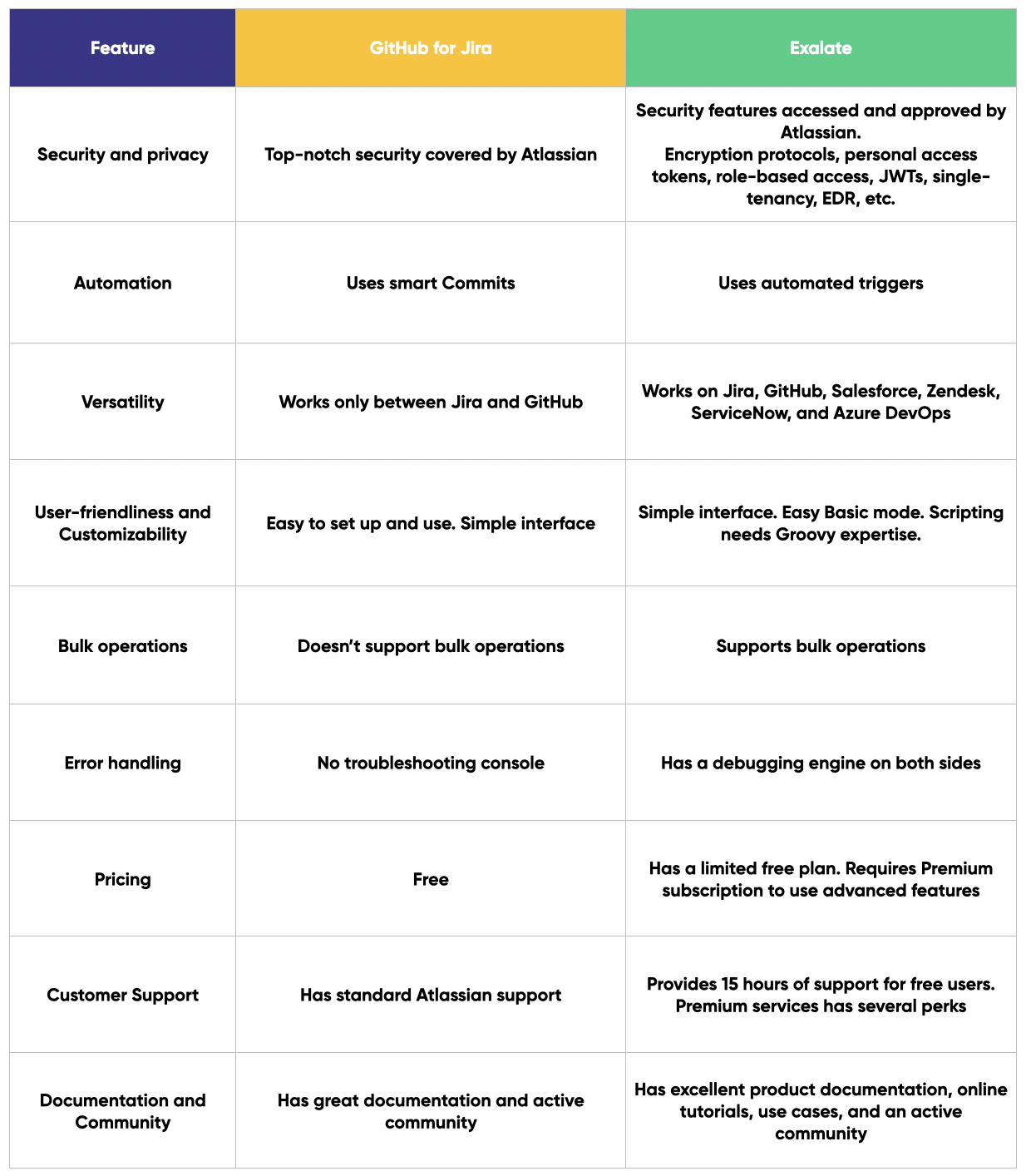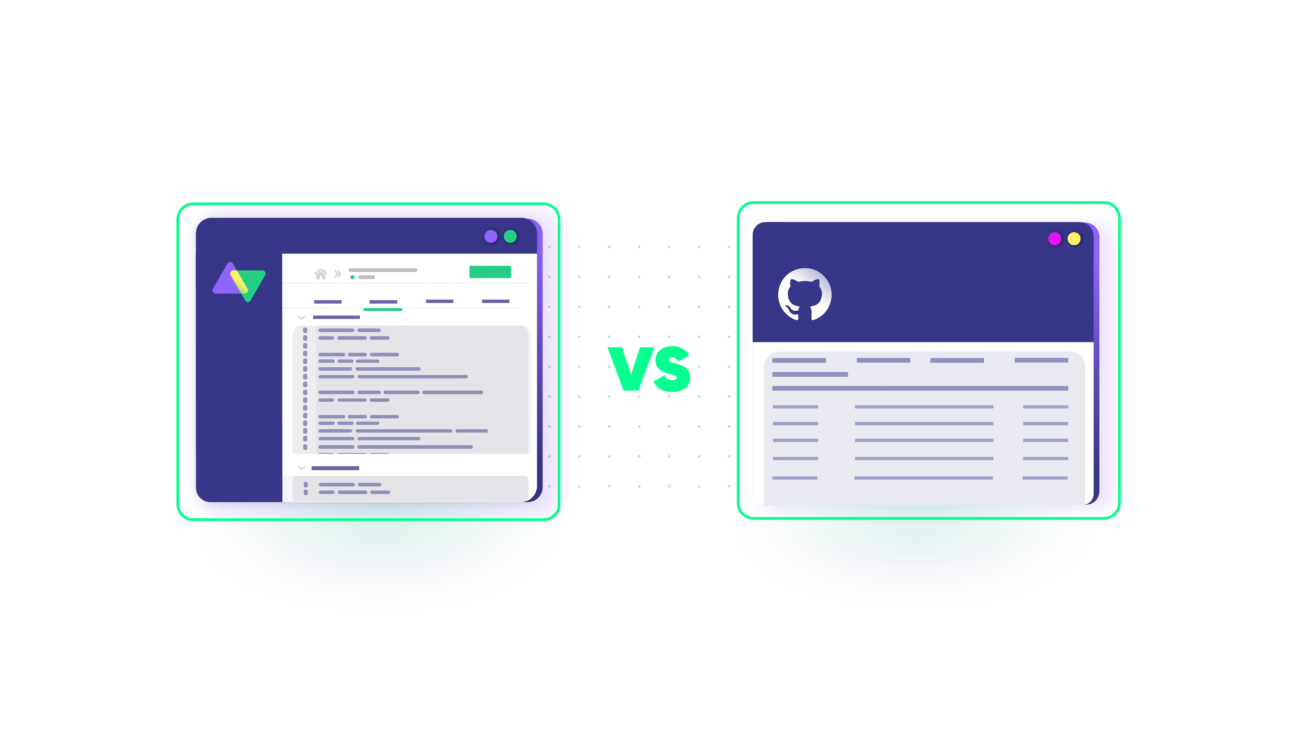Teams working with Jira and GitHub depend on each other to share data and updates reliably and consistently. That’s why they need native or third-party solutions for syncing both platforms using pre-built mapping templates or scripts.
Before choosing any solution, you have to compare them with other offerings in the marketplace, to figure out which one will work best for you and your teams.
For this comparison, I’ll be focusing on Exalate and GitHub for Jira. Come along, let’s compare their main features, pricing, and licensing to determine which one performs better.
This blog post covers the following:
- What is GitHub for Jira?
- What is Exalate?
- GitHub for Jira vs. Exalate: Comparing Key Features and Attributes
What is GitHub for Jira?
GitHub for Jira is an app that seamlessly integrates with Jira in order to view information branches, pull requests, builds, and much more on your organization’s repo.
This Jira GitHub integration app supports Github Cloud, GitHub Enterprise Cloud, and GitHub Enterprise Server. It also relies on smart commits to replicate GitHub actions in Jira.
What is Exalate?
Exalate is a bi-directional integration solution that enables you to sync data between different ITSM tools like Jira and GitHub, along with other work management platforms like Salesforce, ServiceNow, and more.
This decentralized solution allows developers to share and receive updates from GitHub with other users on Jira.
Exalate also supports no-code integration as well as script-based connections. You can even customize connections with automated triggers.
GitHub for Jira vs. Exalate: Comparing Key Features and Attributes
It is important to note that GitHub for Jira only supports integration between GitHub and Jira, while Exalate supports other platforms as well. For the sake of fairness, I’ll be narrowing down the comparison to Jira and GitHub features as much as possible.
Security and Privacy
Both solutions are GDPR-compliant.
Exalate uses HTTPS to secure data transmissions. It also employs standard encryption protocols such as 256-bit AES/CBC, TLS 1.3, TLS 1.2, SFTP, and FTPS. It is ISO 27001-2002 certified.
Apart from standard encryption, Exalate also relies on JSON Web Tokens (JWT), personal access tokens, and OAuth authentication to verify users.

The Exalate engine rests on a single-tenant architecture and addresses incidents using advanced endpoint detection and response (EDR). Other security features available on Exalate include role-based access control and access tokens.
As an Atlassian product, GitHub for Jira relies on Atlassian’s security and privacy architecture, which is quite robust. It’s safe to say that your connection is in secure hands.
User-Friendliness and Customizability
GitHub for Jira has a read-only interface. Once you install the app on both sides, you only need to connect by adding a shortcode to your repo.
Setting up Exalate is a bit trickier. First, you have to install the app and obtain your license. Then you can start setting up your connection using the code-free (Basic Mode) and code-based (Script Mode) versions.

Starting with the Basic Mode is quite straightforward; it gives you access to templated mappings. But if you want customizable connections, you need to write some code in Groovy using the Script Mode.
So GitHub for Jira is more user-friendly, even though it offers fewer options.
Versatility (Supported Entities)
GitHub for Jira is a one-way synchronization tool that only supports data movement from GitHub to Jira.
This is how it works: A developer makes changes to the organization’s repository. The integration solution picks up the change via webhooks and sends it to Jira. However, changes on the Jira side won’t reflect on GitHub.
In general, GitHub for Jira can track branches, PRs, commits, builds, and deployments. You can view these GitHub issue details right within the Jira issue.

That’s where Exalate bosses GitHub for Jira. With Exalate, you can sync data from keys, types, assignees, reporters, summaries, descriptions, labels, comments, resolutions, priorities, statuses, attachments, projects, and many more. This bi-directional flow of information ensures better communication and collaboration between both sides.
Exalate now does one better by supporting connections to multiple GitHub repos at once. It also supports connections between Jira, GitHub, Zendesk, ServiceNow, Azure DevOps, and Salesforce; the permutations go on and on.
Bulk Operations
GitHub for Jira does not support bulk operations: you have to serially connect every issue or comment.
Exalate, on the other hand, supports bulk operations. With Bulk Exalate, you can sync and automatically update all un-synced entities with matching trigger search queries. You can also Bulk Unexalate them. The Bulk Connect option allows you to sync multiple entities in one click.
Automation
GitHub for Jira allows you to automate your issue’s workflows to transition issues when activity happens in your GitHub repos. The automation library comes with 3 pre-configured rules:
- When a branch is created, move the issue to “In progress”
- When a commit is made, move the issue to “In progress”
- When a pull request is merged, move the issue to “Done”.
You can use smart commits and source code triggers to automate other parts of your Jira projects.
Exalate automates syncs using triggers, which specify the conditions for controlling connections. Exalate triggers use native query languages for every platform:
- Jira — Jira Query Language (JQL)
- GitHub — GitHub advanced search syntax
Customer Support
All Exalate customers get free support. When you get the Premier Support option, you’ll become eligible for onboarding calls, solution assistance, bi-weekly sync meetings, and other perks.
Atlassian handles support for GitHub for Jira. The service is available for 24 hours from Monday to Friday. So good luck if your sync stops working on a Saturday.
Pricing
GitHub for Jira is free.
Exalate’s free plan supports up to 1,000 new entity twin pairs per month. To get more syncs, you get the Premium plan.
Exalate’s pricing depends on the platform you are working with. You can find out more about pricing here.
Error Handling
Exalate has an error handling mechanism that shows the source of errors: changed platform configurations or workflows, wrong expressions, wrong class definitions, and other potential human-made errors.
This troubleshooting feature allows you to spot errors blocking the sync or making it malfunction.
If the data on the GitHub for Jira interface is not showing correctly, you’d have to debug it yourself and contact support.
Documentation and Community
Exalate has detailed documentation and a dedicated community. The comprehensive documentation page allows users and self-starters to learn more about the product and solve potential problems. You can also follow the Getting Started guide to start working with Exalate.
The Exalate Academy has video tutorials that contain a treasure trove of information about Exalate’s key features.
Exalate has a dedicated community with active users who love to discuss the best ways to make the solution work best for you. You can reach out to other technical engineers and fellow users for solutions to common issues. You can also read case studies and use cases for different synchronization scenarios.
GitHub for Jira also has detailed documentation for setting up the integration on different versions of Jira. The Atlassian community also has active users and technical experts addressing user questions and common concerns.
GitHub for Jira vs. Exalate: The Final Verdict

GitHub for Jira is easier to set up — and it is free. Besides, you are guaranteed to notch security and support since it is an Atlassian product.
But that’s as good as it gets.
Exalate blows it out of the integration water by offering multiple connection modes for customers with different technical skill levels. Exalate also uses single tenancy to isolate your system, which is important for decentralized cross-company collaborations.
Besides, you can automate your syncs with Exalate using native triggers. You can also customize sync rules for any use case using the Groovy scripting engine.
And most importantly, you can use Exalate to share information between multiple work management systems.
Conclusion
Before choosing either GitHub for Jira or Exalate for your organization, consider why you need to synchronize both platforms. You must also factor in security, data privacy, pricing, support, performance, and ease of use.
If you only want to share updates with teammates using Jira, then GitHub for Jira has you covered. But if you want an iPaaS solution that connects with not just Jira and GitHub, but also bosses error handling, then Exalate is the perfect option for you.
Recommended Reading:




